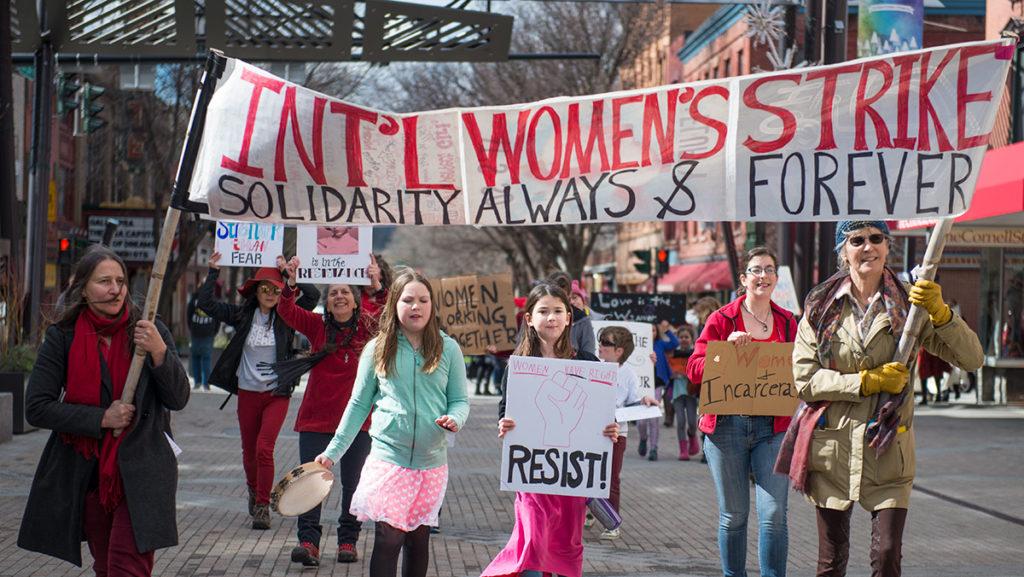In honor of International Women’s Day, some women of Ithaca decided to celebrate in a way that would ensure the community understands their importance: by not showing up to work.
The City of Ithaca was one of many across the globe that participated in “A Day Without a Woman,” also labeled the International Women’s Strike, which encouraged women to take the day off from paid and unpaid labor on March 8, according to the Women’s March website. This means that women could take the day off from work, taking care of children or other duties. More than 50 countries around the world have scheduled strikes or marches to celebrate International Women’s Day, according to a Facebook event page for the International Women’s Strike.
The Ithaca demonstration, which attracted about 200 people, began at noon with a march from Ithaca City Hall to The Commons in front of Center Ithaca. Women of all ages lined up behind a banner that read “Int’l Women’s Strike” as the march began. The women who followed the banner had signs of their own, some of which read, “Women’s rights are human rights,” “Stronger Together” and “Keep your hands off our rights.”
Echoes of their chants bounced off the walls of the city as the march went on. Women traded off rally cries, with one that began, “Show me what democracy looks like,” and was met with the response, “This is what democracy looks like.” Some of the chants addressed controversial plans the GOP and President Donald Trump have proposed, like defunding Planned Parenthood and building a wall along the United States’ border with Mexico.
[gss ids=’24259,24260,24268,24258,24270,24269,24263,24267,24264,24262,24257,24273′ carousel=’fx=carousel’ options=’loop=2&pause-on-hover=true&timeout=2000′]
According to the Facebook page for Ithaca’s Women’s Day March, the purpose of the march is not only to protest Trump’s policies they feel negatively affect women, but to build resistance against the conditions that have led to the rise of Trump and his policies, such as racial and sexual violence, systemic misogyny and economic inequality. Amanda Moretti, an Ithaca local and organizer of Ithaca’s march and strike, said she wanted to organize this event not only to support women in the United States, but to support those around the globe who have struggled for equality for centuries.
Janet McCue, resident of Schuyler County, joined the march in a black and pink cape complete with a slogan on the back which read, “Make America really great, ban misogyny,” intended to jab at Donald Trump’s campaign slogan, “Make America Great Again.” She said part of the reason she wanted to join the strike was because of Trump’s disrespectful language toward women.
“I would hope we would know this already — that women are valuable members of our society and that we keep lots of things running,” McCue said.
Freshmen Ithaca College students Soren Beck and Cameron Coughlin also missed class to attend the strike because they felt it was important to show their support for the movement.
“To actually go out into the world instead of sitting in a safe classroom is really important to make change,” Beck said. “You can’t just sit in a class and talk about it.”
There has been some criticism directed at the movement that the strike is a day for privileged women who can afford to take a day off work and who have the luxury of childcare to protest. Beck said she understands this criticism, as her mother was not able to join in with the strike because she could not afford to take a day off work. However, she said those who have privilege should use it to make a difference.
“Being in a position of power — and people who are in positions of power should always put their privilege to good use by coming to [events] like this — as long as you’re not fighting for your own self, alone, as long as you’re fighting for the people who can’t be here, too,” Beck said.
Moretti said the point of the strike and march is to stand up for women who do not necessarily have the power themselves to protest the injustice they may face.
“It’s to stand up with the other people who are in desperate situations,” Moretti said. “It’s to show what has been happening for years — not just now, not just with the Trump Administration.”
Another criticism that these women’s movements have faced is that they lack intersectional feminism — feminism that includes the struggles women of color or women within the lesbian, gay, bisexual and transgender community. Some women at the rally sought to address this issue — holding “Black Lives Matter” signs and shouting “Old Jim Crow, new Jim Crow — racist systems have to go.” However, most of the participants were white, given that Ithaca is a predominantly white city — according to U.S. census data from 2010, 70.5 percent of the city’s population is white.
Carla Golden, professor and women’s gender studies coordinator in the Department of Psychology, attended the event and stated later in an email that it moved her emotionally and that she was cognizant of the intersectionality of the march.
“It feels good to be in this kind of collective space, and to be part of local/global uprisings of people resisting and standing up for justice on the diverse issues embodied by contemporary intersectional feminism,” Golden stated.








